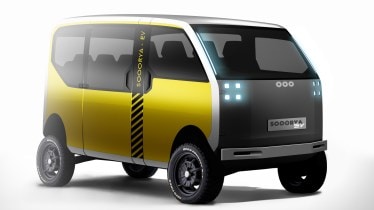Singapore-based electric vehicle start-up Sooorya EV has revealed its plans for India and the global market. It aims not only to ride the green mobility wave but also to focus on manufacturing green vehicles in India for the domestic and export markets.
In a recent interaction with Financial Express Online, Christie Fernandez, Founder & CEO, Sooorya EV revealed the company’s story and future gameplan. The Singapore-based start-up was founded in 2017, and initially was focusing on partnering with autonomous tech companies in Singapore to build RoboTaxis. However, it realised that the market for RoboTaxis was still a couple of decades away, and hence pivoted towards driver-driven, shared mobility EV’s for emerging markets.
“Over the last 7 years, we have iterated Sooorya EV many times, so as achieve the best PMF (Product Market Fit) for last-mile shared mobility in the emerging markets of the Indian Subcontinent, the ASEAN region, African continent and South America. The key driving factors for Sooorya EV is in creating a positive social & climate impact, besides profitability for all stakeholders – Operators / Owners / Drivers / Commuters. Propelling ACE (Affordable / Comfortable / Ecofriendly) mobility and empowering people in developing countries is our main objectives,” said Fernandez.
The bootstrapped start-up is working on an innovative business model, which it says requires a low CAPEX, based on its “unique vehicle architecture & modular design ‘designed from engineering’ which enables ‘platform-based assembly’ in ‘Micro-Factories’.”
This he says has helped it to focus on building core competencies instead of just burning funds.
“Normally, EV startups and automakers spend millions of dollars to get to this stage, and some of them realise that there is no PMF (Product Market Fit) after building their show prototype. Dyson Motors is a good example of realising no product-market fit after spending over $500 million building their prototype. We did not want to go down the same path, hence spent a lot more effort to arrive at our unique vehicle architecture and get our PMF (Product Market Fit) right,” he explained.
Focussing on intracity models
Unlike traditional carmakers, Sooorya EV is working on building a ride-sharing model from scratch. Sooorya EV’s existence is on the back of the fact that there is hardly any vehicle purpose-built to suit the needs of the ride-hailing/sharing business because large manufacturers are not focused on the passenger fleet segment.
Then there is the focus by the government to reduce CO2 emissions across geographies. In terms of business case, the market for intra-city taxi hailing services is projected to grow rapidly to over $379 billion (Rs 31,57,449 crore) by 2027 (Statista). This translates to the number of users of ride-hailing & taxi services to be well over 1.45 billion and the annual sales of passenger fleet vehicles will be around 12 million.
Enter Sooorya modular EV, which the start-up claims will come with a seating configuration of 2 + 3 + 3; the vehicle will be equipped with plug & ply technology for fleet operations, including GPS / Wifi / touchscreen for apps and seat sensors among others. In terms of creature features, the idea is to focus on having a minimalistic approach focussing only on the necessities of the customer, thereby reducing the overhead/production cost. This means, no fancy bigscreens, infotainment or multiple speakers, etc.
The EV the start-up says will come with a range of 200km, and top speed of 70kmph which the company believes is more than sufficient to meet the need of the intra-city users.
“After evaluating multiple drivetrain and batteries, we have now arrived at a unique vehicle architecture (fixed + swappable) batteries. The advantage of this unique vehicle architecture is ‘Zero Charging Downtime’ crucial for the fleet segment. We are also integrating a solar roof, along with fixed + swappable batteries. This provides multiple charging options, important in emerging markets with poor grid infrastructure,” revealed Fernandez.
Production and pricing
One of the key challenges for any new entrant in the automotive industry has been the high CAPEX cost associated with establishing a robust supply chain and production hub.
Fernandez shared that the company “intends to assemble Sooorya EV in ‘Micro-Factories’ owned & franchised ‘Contract Manufacturers’ in all the countries we operate. Large countries such as India, will have multiple ‘Micro-Factories’. In fact we can have a ‘Micro-Factory’ in almost every state, which will help reduce logistic costs and improve manufacturing/distribution efficiencies.”
The start-up has a conservative plan of manufacturing 1,000 units in the first year, 10,000 units in the second year for the Indian market, gradually scaling up to 38,000 units and 52,000 units in the 3rd and 4th year for India and ASEAN markets. If all goes according to plan, the start-up aims to produce 52,000 units in the fifth year for global markets.
All this will require funding, Fernandez said that at present it is looking to raise $8 million (Rs 66 crore) to engineer and build the first batch of models, which will be rolled out in 9-12 (testing/certification) months after securing the funding, with a launch after 6 months in the market.
He is confident that “investors at this stage can expect a quick and good RoI (Return on Investment), because we can achieve a turnover of over $1 billion (Rs 8,331 crore) within 4 to 5 years from market launch. And valuations will shoot up once we launch our product in the market within 12 to 18 months from initial funding. An additional $30 million (Rs 250 crore) for manufacturing ramp-up & market expansion will be funded by debt and equity. We already have some large global corporate investors & VCs evincing interest, who are keen to invest in our growth phase.”
The pricing of the model is being slated to be between $12,000 (Rs 10 lakh) and $17,000 (Rs 15 lakh) depending on the configuration Economy (D + 7), Business (D + 4), Luxury (D + 2).
